Inside the Wagner Group, Russia’s mercenary force
One Wagner Group soldier for hire talks with Al Jazeera about what being a mercenary for Russia is like.
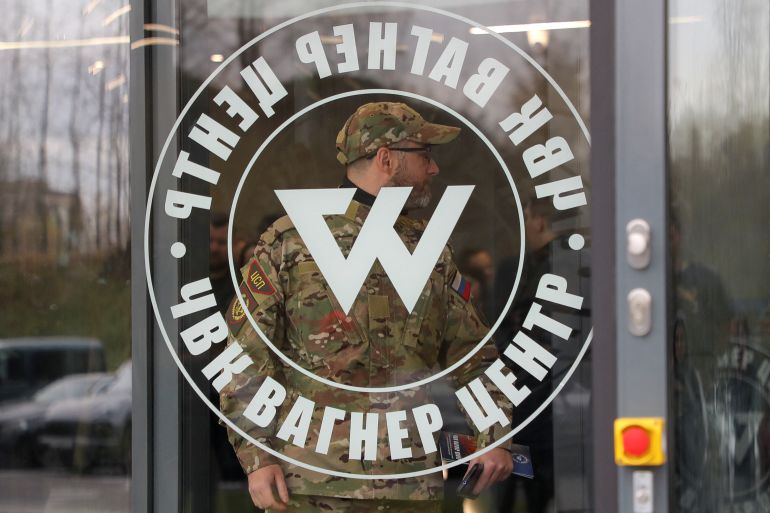
The Wagner Group is shadowy and illegal, but it has been tracked to Ukraine, Syria, Libya, the Central African Republic, Mali, and elsewhere. It is known as a deadly fighting force of mercenaries with a goal of furthering Russia’s military interests around the world. One Wagner fighter is now speaking out about what life is like as a soldier for hire.
Keep reading
list of 4 itemsA radical antidote to climate despair
Immigration, migration and nationality in the World Cup
As Egypt hosts COP27, prisoner Alaa Abd el-Fattah risks his life
In this episode:
- Niko Vorobyov, British and Russian journalist for Al Jazeera
- Marat Gabidullin, Former member of the Wagner Group in Ukraine and Syria
Connect with us:
@AJEPodcasts on Twitter, Instagram, and Facebook
Full episode transcript:
This transcript was created using AI. It’s been reviewed by humans, but it might contain errors. Please let us know if you have any corrections or questions, our email is TheTake@aljazeera.net.
[THEME MUSIC PLAYING]
Halla Mohieddeen: Just a warning before we start. This episode contains graphic descriptions of violence. Some listeners may find it upsetting.
Halla Mohieddeen: Officially – the Wagner Group does not exist. It never existed.
Newsreel: There is no registration, no record of tax returns. Everybody from the Kremlin to the Russian Defense Ministry to the Russian president himself, they’ve all denied the existence of this organisation.
Halla Mohieddeen: Not only that – they’re not allowed to exist.
Newsreel: Private military companies are still illegal under the Russian constitution.
Halla Mohieddeen: And still, the Wagner Group has cropped up in Ukraine, Syria, Libya, Central African Republic, and Mali, expanding Russia’s military interests abroad.
Marat Gabidullin: Mercenaries are more motivated. Mercenaries are more persistent in achieving the goal.
Halla Mohieddeen: But what is it like to be a Wagner Group mercenary? Why one soldier for hire says he joined the group and what he has to say about it’s role is in conflicts around the world. I’m Halla Mohieddeen and this is The Take.
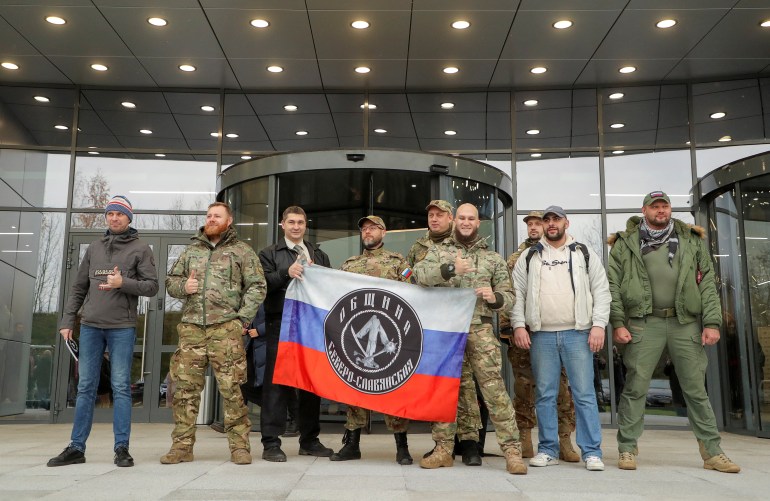
[MUSIC PLAYING]
Halla Mohieddeen: Can you just start by introducing yourself?
Niko Vorobyov: My name’s Niko Vorobyov. I’m a Russian British freelance journalist.
Halla Mohieddeen: Niko’s done lots of reporting on Russian mercenaries including stories for Al Jazeera. And recently he interviewed a former member of the Wagner Group.
Marat Gabidullin: My name is Marat Gabidullin. In 2015, I joined Wagner. Resigned in 2019.
Halla Mohieddeen: We should also say that Niko spoke with Marat in Russian so they could speak freely.
[NIKO AND MARAT SPEAKING IN RUSSIAN]
Halla Mohieddeen: But, you’ll also hear Marat speaking to us about his experiences with Wagner in English.
Niko Vorobyov: So, Marat used to serve in the air forces. So he was a paratrooper in the 90s.
Marat Gabidullin: I am a former officer of the Airborne Troops of Russia.
Niko Vorobyov: And then the opportunities around Wagner arose kind of like the mid 2010s.
Halla Mohieddeen: What did Marat tell you about how he got his start?
Niko Vorobyov: At that point, he told me he was at quite a low point in his life searching for something to do.
Marat Gabidullin: I worked in the private sector as a bodyguard, then head of bodyguard, and then head of the security service. I did not really like my field of work. And eventually I lost interest and was in a state of deep depression. I did not know how I should build my life.
Niko Vorobyov: And he had military experience already. He heard about this opportunity to make some money
Marat Gabidullin: My friend told me that in Russia there is a structure where I can rediscover myself and return to the military profession.
Niko Vorobyov: And yeah, that’s basically how he signed up.
Halla Mohieddeen: But it’s not all patriotism and rallying around the Russian flag for a lot of these mercenaries.
Niko Vorobyov: Based on what Marat’s told me, some of them try to dress it up as patriotic duty but what he tells me is the money is their primary motivation.
Halla Mohieddeen: And was that Marat’s motivation for becoming a mercenary?
Niko Vorobyov: Yeah, both for financial reasons and searching for purpose.
Halla Mohieddeen: 2014 is when most people will tell you the Wagner Group first began. Members of the group started appearing amongst several other private military contractors in Eastern Ukraine.
Niko Vorobyov: I’ve met another ex-member of Wagner who was with them from the very beginning. He went to East Ukraine to fight as a volunteer in the original war in the Donbas in 2014, 2015.
Halla Mohieddeen: The Donbas is Ukraine’s Easternmost province. And Wagner was fighting there on behalf of Russia.
Newsreel: This is when Russia annexed Crimea. The Wagner Group played an enormous role in the annexation.
Halla Mohieddeen: By 2015 Russia had control of the Crimean peninsula. And around that time, Marat joined Wagner too.
Marat Gabidullin: I decided to take this chance and went to the military training ground.
Halla Mohieddeen: It all happened quite quickly, he says.
Marat Gabidullin: Mercenary units do not go through the full course of training. Mercenaries are used primarily as assault squads. The first business trip took place in the summer of 2015 in Lugansk.
Halla Mohieddeen: Marat first went to the heart of the Donbas.
Newsreel: The Russian army turned to Wagner’s mercenaries, known as little “Green Men.” They reportedly assassinated rogue separatist leaders, and participated in the Battle of Debaltseve.
Halla Mohieddeen: And according to Niko, many of those original fighters never left.
Niko Vorobyov: A big core of the group consisted of veterans of the original conflict in the Donbas.
Halla Mohieddeen: And that’s where Marat started learning what the Wagner Group does.
Niko Vorobyov: So It was used in operations where Moscow didn’t want to be seen as getting its hands dirty, you know. So for example, in Africa, in the Middle East.
Halla Mohieddeen: And Marat says it was started by the Russian government.
Marat Gabidullin: Wagner was created by the Ministry of Defense, originally, as a tool of warfare. Now, Wagner has transformed.
Halla Mohieddeen: They are no longer part of the Russian military – but the military is still involved, Marat says.
Marat Gabidullin: The military coordinates their action.
Halla Mohieddeen: And Niko says that means more flexibility for the Russian government.
Niko Vorobyov: Basically because private military companies, or mercenary outfits, as they’re more commonly known, because they’re officially illegal in Russia, that gave Wagner sort of like a plausible deniability. Like, they could be used by the Kremlin, by Moscow for operations they don’t wanna be directly tied to.
Halla Mohieddeen: They can fight a war, kill, be killed and the whole time – claim they were never there.
Niko Vorobyov: Either for political reasons, or they’re afraid of backlash back home once the bodies start coming back.
Halla Mohieddeen: This formula was working for Russia, Niko says. And the annexation of Crimea was a clear success. So, Marat stayed on for round two.
Marat Gabidullin: I went from a private soldier in a combat unit to the commander of the reconnaissance company. The entire year 2018, I worked as a chief advisor of the Syrian battalion of ISIS hunters.
Newsreel: Russia’s arrival in Syria in 2015 was a game changer.
Niko Vorobyov: He joined in the Syria campaign. They played a pivotal role in the Russian war effort.
Halla Mohieddeen: Russia was supporting the Syrian government forces led by President Bashar al-Assad. And when Marat talks about that time – he sounds like someone who takes some pride in the work he’s done.
Marat Gabidullin: In Syria, Russian mercenaries served as the main military force to defeat ISIS. The mercenaries were at the forefront.
Niko Vorobyov: He was the first former member of Wagner to openly talk about the group. He published a memoir called, In the Same River Twice, about fighting in Syria. The reason why he wanted to speak out is because he felt mercenaries, people like him, they were a huge part of the Russian war effort in Syria, and campaigns around the world. But they often don’t get acknowledged. They have families, their families see coffins coming back from the battlefield, but they didn’t get the medals. They didn’t get the recognition that he and others feel that they might deserve.
Halla Mohieddeen: Marat says the casualties weren’t recorded.
Marat Gabidullin: The main task was to achieve a military victory and hide the real number of losers of the Russian military contingent. The losses of mercenaries were not included in the statistic of official losses. And the Russians got the impression that the Russian armed forces defeated ISIS with little bloodshed. The combat experience of mercenaries also matters. They fought more than the army.
Halla Mohieddeen: And Marat talks a lot about the casualties the mercenaries suffered. But, of course, Niko spoke to him about the casualties they inflicted as well.
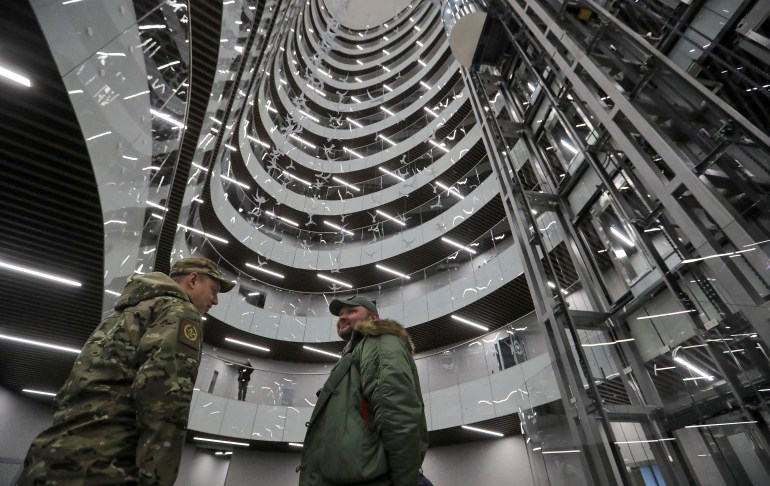
[MUSIC PLAYING]
Halla Mohieddeen: And we should say that it is pretty rare to be able to speak with someone who works with the Wagner group. Does he regret serving in Wagner and the things that he did or is he proud of it?
Niko Vorobyov: He told me from a professional perspective, no one could have done the things that Wagner did in Syria. The regular Russian army would not have been able to carry such things out.
Halla Mohieddeen: Is that because they aren’t bound by the moral and ethical constraints that other armies are. Or they’re just simply stronger?
Niko Vorobyov: I don’t think he was referring to Wagner soldiers necessarily being stronger. I think he was more referring to the legal vacuum in which Wagner operated, and at the lack of oversight. Because the way the Russian military tried to present the Syria campaign was a bloodless campaign from the Russian side. Now we have social media, so now we can see the ugliness for what it is. If we had Instagram back in the Napoleonic wars, I think we’d have seen some things we regretted.
Halla Mohieddeen: Marat, did he ever express any kind of reservations about the sort of work he was, being engaged to do? Or even when he spoke with other mercenaries, other people from his Wagner days.
Niko Vorobyov: During the Battle of Palmyra, Marat was actually wounded by Grenade Blast, which took him out of action.
Newsreel: The war came to Palmyra, fighting between Syrian rebels and government forces peppered the ancient buildings with bullet holes.
Marat Gabidullin: When I was badly wounded under Palmyra, I could not stand up and even roll over on my stomach. I was afraid that ISIS would capture me and began to crawl back to my people on my back, and shoot into the void in front of me.
Halla Mohieddeen: Marat told Niko this injury was a serious one.
Niko Vorobyov: It was an injury serious enough to make him less than combat-able. I’m not sure if he was deployed to the frontline since then.
Halla Mohieddeen: Did they believe in the missions that they were being asked to carry out, or did they just not care?
Niko Vorobyov: Perhaps some of them really do believe in the special operation in Ukraine and what it means for Russia. I mean, I’m talking about right now. But, when Marat was around, I believe, he told me that the main motivation for them was money and everything else was basically just dressing up.
Halla Mohieddeen: But what were these men able to do for money? That’s after the break.
Halla Mohieddeen: We’re talking to journalist Niko Vorobyov about Marat Gabidullin, a former mercenary for Russia’s Wagner group, who was active in Syria.
[MUSIC PLAYING]
Halla Mohieddeen: He got injured at Palmyra. And I remember covering that and one of the striking bits of footage that I was looking at was, Palmyra, was this UNESCO World Heritage Site.
Newsreel: Palmyra’s ancient buildings and Amphitheater drew tourists from around the world.
Halla Mohieddeen: And you had these archeologists and scientists who were being tortured it was just, really grim and affecting for me to watch.
Newsreel: For half a century, Khaled Assad was a guardian of Palmyra’s ancient Roman ruins. It’s here, where the 82-year-old academic’s believed to have been beheaded by the Islamic state of Iraq and the Levant.
Halla Mohieddeen: The awfulness of that combat and the awfulness of people getting dragged into it for defending works of historical and natural beauty. It just seemed like such an ugly, ugly battle to be in.
Niko Vorobyov: Yeah. So the Syria campaign, me and Marat discussed this at length. There was a famous incident, which first uncovered this scandal. So, there was video footage on the internet of a group of Wagner mercenaries torturing, killing, and dismembering a Syrian conscript who’d gone AWOL.
Newsreel: One of the most disturbing incidents of the war in Syria, an unarmed man taunted and tortured by four Russian speaking men in military fatigues.
Niko Vorobyov: And they’d actually cut off his head. I’m looking at a picture of it now, there’s four of them standing around, posing, two of them looking quite happy about it next to this severed head.
Halla Mohieddeen: Just to be clear, Marat says he was not part of this incident. But if this was happening and it was Wagner group members, in a way it becomes the image of the Wagner group: horrific incidents like this one. So what were Marat’s thoughts?
Niko Vorobyov: I asked Marat about it. He said that for the most part, like such, such instances were rarities.
Halla Mohieddeen: Though, he did admit to some problems among the ranks.
Niko Vorobyov: There was definitely an element of psychopathy among some members. But he said that the majority of Wagnerites were professional in that sense and that his unit, while he was there personally, didn’t engage in any atrocities. I can’t find any evidence that he was involved in atrocities either.
Halla Mohieddeen: Sure, but with any military, their conduct during campaigns overseas. The Americans, the Abu Ghraib sort of torture allegations in Iraq. Those are serious allegations and soldiers themselves feel that deeply. Because you can always say it’s a few bad apples. It’s not us, but it reflects on the whole of the military. And it almost takes away their legitimacy in a sense. And if soldiers aren’t involved they feel very deeply and we will fight to take that kind of thing down. Is there that sense of pride of being part of the Wagner group? Was there a recognition from Marat that there was a bit too much of this kind of barbaric nonsense going on and it wasn’t a professional force and something that he would not feel comfortable defending or being a part of?
Niko Vorobyov: I mean, obviously like I haven’t been to Syria with him and I can’t verify his claim, but he says he didn’t witness any such atrocities.
Marat Gabidullin: You cannot rob and kill civilians.
Niko Vorobyov: He did acknowledge the beheading. He referred to them as four sadistic bastards who should have never been brought out to the field.
Marat Gabidullin: The episode with the execution of the Syrian is an isolated case. It is not a systematic manifestation.
Halla Mohieddeen: That’s not to say that there aren’t questionable practices – within the Wagner group.
Marat Gabidullin: They have their own laws that allow out of court execution.
Niko Vorobyov: But I would say the fact that for a long time it was very much operating under the shadows. That would’ve led to a lack of oversight.
Marat Gabidullin: Mercenaries can afford to violate the Geneva Convention, since mercenaries are outside the legal field. Also now in Ukraine, inside Wagner, there are strict disciplinary standards. They have their own laws that allow out of court execution.
Halla Mohieddeen: Right now, Wagner is facing legal action for “terrorism” using “torture, murder and rape as weapons of war” in Ukraine.
Niko Vorobyov: The men involved in the Syrian beheading, I don’t think that they’ve been prosecuted or investigated by the Russian courts at all. So perhaps there’s an element of sort of officialdom protecting them in a sense.
Newsreel: Moscow said the reports have nothing to do with Russian military operations in Syria and requests to launch a probe were dismissed.
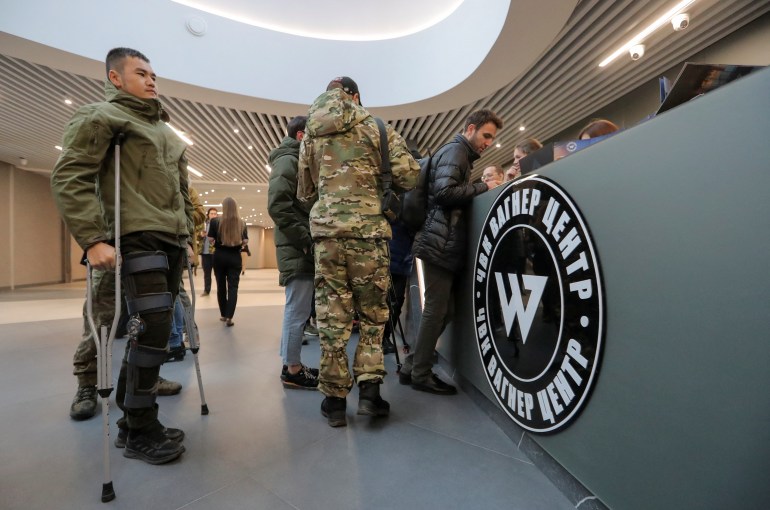
[MUSIC PLAYING]
Halla Mohieddeen: Controlling the message seems to be one of the main benefits of the Wagner group for Russia, Niko says.
Niko Vorobyov: There was actually an incident between Russian and American forces in Syria where the Russians were hit by American war planes.
Newsreel: Russian media say an unknown number of private Russian military contractors were killed, possibly up to 200. US officials estimate the death toll at around a hundred.
Niko Vorobyov: Like probably the deadliest such incident since the Cold War. But we didn’t really hear about it too much because again, like, Wagner operates in the shadows.
Halla Mohieddeen: It was in a place called Deir ez-Zor and Marat found himself there twice.
Marat Gabidullin: The second time, we ran into the Americans near Deir ez-Zor. We could not oppose the Americans. It took a lot of effort to control ourselves and not to panic.
Halla Mohieddeen: So, Marat, who lived and breathed Wagner – he risked his life. And saw his fellow fighters die.Was it for Wagner? For Russia? It’s still not 100% clear. So, I had to ask Niko this question again.
Halla Mohieddeen: Is he proud of what he did as part of Wagner?
Niko Vorobyov: I think in a professional sense you could say that Marat is proud.
Halla Mohieddeen: But you heard that pause. It’s still complicated, Niko says. Marat knows Wagner is involved in the war in Ukraine and he also knows he does not support it at all.
Niko Vorobyov: Regarding his thoughts on the war in Ukraine, now in general, he referred to it to me and in other interviews as an absolutely criminal adventure and a mistake.
Halla Mohieddeen: In September, Putin announced Russia would be building his forces in Ukraine by mobilising citizens to fight – what amounted to a draft.
Vladimir Putin: I think it is necessary to support the decision to partially mobilise citizens of the Russian Federation.
Halla Mohieddeen: But, instead of supporting his decision, we saw videos of Russians protesting and many potential soldiers rushed to leave the country.
Niko Vorobyov: Hundreds of thousands of Russian men have fled the country since September, trying to not fight in Ukraine either because they’re against the war or they just don’t want to die for it.
[MUSIC PLAYING]
Halla Mohieddeen: Are Russian men joining Wagner with the idea that they’ll at least be paid to fight?
Niko Vorobyov: Yeah. There hasn’t been a massive enlistment. Quite the opposite. definitely the primary motivation is money.
Halla Mohieddeen: And what sort of money are we talking about? Say I was to do that, you know, how much money could I expect to get paid?
Niko Vorobyov: Hang on, let me just do a quick currency conversion. There’s actually been billboards advertising the mercenaries. So now Wagner is more out in the open and on social media as well, we’re seeing wages being advertised of 240,000 rubles a month, which translates to just under $4,000. Which is much, much higher than what a regular soldier would get paid.
Halla Mohieddeen: Yeah, no kidding.
Halla Mohieddeen: And just in the past month, Wagner had what you could call a grand opening event.
Newsreel: It’s the opening ceremony of a brand new centre belonging to the Wagner group billed as a kind of patriotic hub for fresh thinking on all things defence.
Newsreel: The mission of the paramilitary Group, Wagner Center, is to provide a comfortable environment for generating new ideas to improve Russia’s defence capability.
Halla Mohieddeen: And the implication is that it is, in a sense, endorsed by the government. Does that change the equation almost? Does this mean it’s no longer illegal for people to join Wagner?
Niko Vorobyov: As far as I know, private military companies, mercenary outfits haven’t been officially legalised in Russia. But I think it basically just gets officially ignored.
Halla Mohieddeen: Niko’s seen Wagner recruiting on Telegram in Kyrgyzstan. It sounded like your run of the mill security job in a mall, but.
Niko Vorobyov: It was actually a security gig in the special operation zone of Ukraine, which as a local journalist in Kyrgyzstan uncovered, it was actually a front for Wagner.
Halla Mohieddeen: There are also reports of Wagner looking to Russian prisons to find fighters to send to Ukraine.
Newsreel: According to a new report, the chief of the Wagner Group is personally touring Russian prisons. Apparently that’s their talent pool.
Halla Mohieddeen: What’s Marat doing now?
Niko Vorobyov: So Marat now he’s in the process of seeking asylum somewhere in France. Don’t wanna disclose what little I know of his current location.
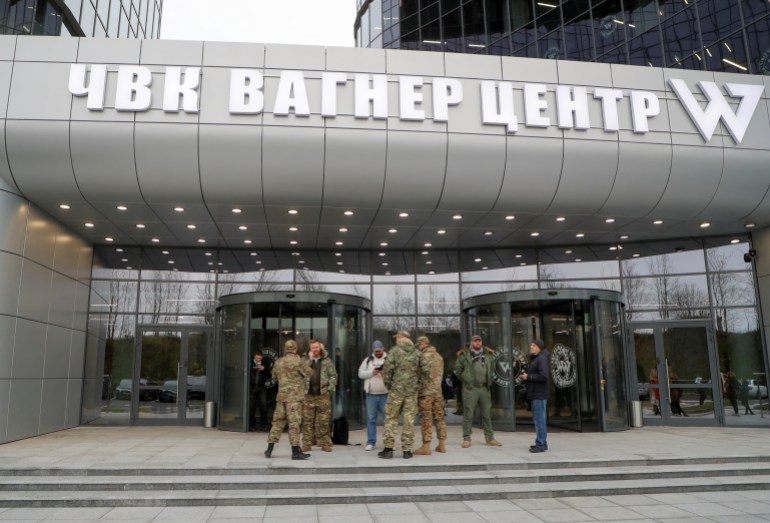
[MUSIC PLAYING]
Marat Gabidullin: Now, I am preparing the second part of the book of memories about working in Wagner. In this book, I reveal the essence of what they really are.
Halla Mohieddeen: Is he worried about Russia or about Putin coming after him now?
Niko Vorobyov: I’ve heard that even in France, some have been targeted for assassination.
Marat Gabidullin: I am taking security measures. I am aware that I am in danger and the leaders of Wagner are hostile towards me.
Niko Vorobyov: I think that there is a threat, but I also think the Russian government right now has other priorities.
Halla Mohieddeen: And for now, Niko says, the Wagner group may be safe too.
Niko Vorobyov: In the short term, most definitely they’ll be around. I think that we’ll see them throughout this conflict. The long run, 10 years or beyond, we’d have to see because Putin’s already getting old and considering all the crisis Russia’s finding itself under, the huge drain and resources, that the war in Ukraine is. Because the Wagner group is so closely linked to the current regime in Moscow, I think Wagner’s fate is intertwined with the current government
Halla Mohieddeen: So, if the government goes, Wagner likely goes too, Niko says.
Niko Vorobyov: Yeah. That’s how I’d say it.
Halla Mohieddeen: And that’s the Take.
This episode was produced by Amy Walters with Alexandra Locke, Ruby Zaman, Chloe K. Li, Negin Owliaei, Ashish Malhotra and me, Halla Mohieddeen.
Alex Roldan is our sound designer. Aya Elmileik and Adam Abou-Gad are our engagement Producers. And Ney Alvarez is our head of audio.
We’ll be back on Monday.
Episode credits:
This episode was produced by Amy Walters with Alexandra Locke and our host Halla Mohieddeen.
It was fact-checked by Ruby Zaman. The production team includes Chloe K. Li, Alexandra Locke, Ashish Malhotra, Negin Owliaei, Amy Walters, and Ruby Zaman. Our sound designer is Alex Roldan. Our engagement producers are Aya Elmileik and Adam Abou-Gad. Ney Alvarez is Al Jazeera’s head of audio.